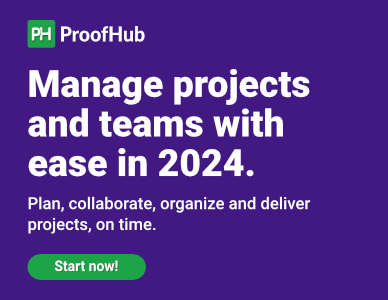Managers and employees often are not reluctant to have one-on-ones. Some managers are not comfortable dealing with one-on-ones. While some of them complain that these meetings are not helpful and shouldn’t happen at all.
Are one-on-one meetings so ineffective? Certainly not, if you are doing it well. We have probably all done it wrong many times. One on ones are fruitful for managers to build strong team and build a productive working relationship with the team.
Are one on one meetings with employees on your weekly or monthly to-do list? There is a one good reason to prioritize it always on your calendar – to have the connection. But make sure you are using it wisely to meet the employees goals. You definitely need to have the connection with your team for the growth of your company and growth of your team.
“Want to maximize collaboration at the workplace?”Try ProofHub!
What is the purpose of one-on-one meeting?
One-on-one meeting is a perfect way to practice team management and meeting the needs of the employee. It is a way to provide an uninterrupted private time to talk about project status and personalized feedback and mentoring.
Keep morale high and projects on track
Holding one-on-one meetings on recurring basis will keep your employees involved in projects. It will prevent them from going astray the tasks and keeping their focus on project. It establishes ground rule for employees to follow up and managers to receive the feedback. Employees can do the talking in one-on-one meeting and discuss all grievances.
Creates a better routine
One on one meetings is the best way to manage the work in a better way and create a routine to discuss work progress. It helps in discussing updates, obstacles and what the employees are learning. Having a regular scheduled conversation to manage work will increase productivity, accountability and development.
Personalized feedback
One on one meetings are usually informal and generates a personalized feedback for each employee. It helps to track what is need to be said and what you want to talk about. Managers can promote open communication and immediate regular feedback.
Builds strong relationship
It is a critical part of leadership to talk about broader topic with team members. And this can be possible by having a good relationship with your employees. Understand the individual needs of each of your staff. Know they likings, dislikings, interests and what do they care about. One-on-ones can help in gaining insight about every person’s perspective on their work and help in leading and retaining staff.
Opportunities to speak privately
While you may be talking to your employees randomly all the time but talking to them privately one-on-one can bring out more about them. They can easily share things with you as they will find the “right opportunity.” You are much more likely to hear their ideas, and get their feedback. More regular conversations increases development opportunities significantly.
From our experience of conducting one-on-one in ProofHub, it stops the upcoming problems and brings tasks on track, builds trust and makes sure that the employees are valued.
Now that you know the importance of one-on-one meetings in your organization with your employees, lets see what are the best practises for getting the most out of your one-on-ones.
Express gratitude
It does not always take expensive gifts to make your employees happy. Let them know that you appreciate their work. Give them a note of appreciation and gratitude. Just “slow down and say ‘Thank you.’ Employees thrive at work when they know their efforts are meaningful and their contributions have meaning. During a one on one interaction with your employees, tell them how important they are for your organization, talk about something they’re doing well or say something like, ‘I appreciate what you’re doing’. When you share with your employees your gratitude, they will never forget you and will return to you many times.
Set a consistent schedule for your meetings
Regular staff meetings will remind your employees of being a part an important part of the organization. A successful one-on-one is possible if you set a realistic schedule and stick with it. Keep your meetings as consistent as possible. Do not be someone who keeps canceling meetings according to your mood.
Come prepared with an agenda
Before you schedule a meeting make sure you are prepared with what you are going to discuss. Establish a purpose for your one-on-one to turn it into an effective meeting. Make a list of topics that you want to discuss, plan new strategies, share your accomplishments, ask their inspiration, get a direction, and get into a conclusion. Have a purpose for your meeting and know what you need from the meetings. Go over the questions you want to ask, leaving room for them to talk as well.
Dig into their excitement element
The top priority of a company should be to maximize employee excitement. Every employee is different and share different interests. “Different strokes, for different folks.” Some employees will prefer doing certain tasks while other employees who would sign up for the exact opposite workload. To get the most of your one on ones keep ask them their keen interests and if they actually enjoy what they are doing. Ask your employees what things they want to work on and how to most efficiently allocate employee resources.
Be fully present
Do not take meetings as just another item to tick off on your to-do list. Consider it as a precious moment for making a connection with your employee. Be fully present to come out with a good conclusion and make a difference in the life of this person. Do not distract yourself from other talks or your phone pings and rings. Give your full attention to your employees so they do not feel awkward during the meeting.
Make the things turn positive
Start your conversation with a positive energy. You are not there to drive your employee into negativity. Make your negative and positive comments part of your meeting. Share with them their accomplishments, compliment their hard work and efforts and motivate them to bring out more ideas. More positive the things turn, the more will they be inspired and productive.
Safe Environment
One-on-one meetings should bring into account the continuous improvement for the employee. Create a environment that doesn’t threatens your employee and you get the maximum benefit. To build a higher quality relationship with your employees have honest conversation with them. Provide constructive feedback and not blame for what has occurred. Your employees will speak up only when they know they won’t lose out a bonus. Playing blame game will close down the reports and nothing useful will be derived from the meeting.
Avoid gossiping
You might be open with some of the team members and during one on one sessions, it might tempt you to use this time to gossip about office politics. Avoid doing this as this will spread negativity and leave a bad impression. Also, this will give more chance to gossips. Maintain the discretion of the company that is necessary for your employee to do their job.
Get feedback, don’t give it
As a leader, you should have an open conversation with your employees about how you can be a better leader. It can be quite overwhelming to bring it out to your employees every week and break their confidence in you but you never know if something big might come up that would compliment them on a job well done. Try asking for feedback once in a while, but make sure you word it the right way.
Is there anything you can do to help employees be more successful?
Make it a perfect venue to ask your employees follow-up questions. For example:
- What are the challenges in the work?
- How are the team members working with each other?
- What is the best and worst part of your job?
- What do you think about the new plan that we discussed?
- What have you learnt in the last week and how much you improved?
- What would you want to do for making work fun?
- What change you want in the organization?
Ask them what you can do to help after listening to what they have to say about everything else.
One -on-ones at ProofHub
Ever since we have implemented the method of having one-on-one at ProofHub, we have a great impact on the success of our tasks. We try to get the most out of one-on-ones by creating a space that is comfortable for individuals to talk about the concerns that are disturbing them.

